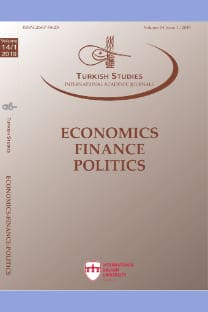Travmatik Olayların Tüketici DavranışlarınaEtkilerine Yönelik Nitel Bir Araştırma
A Qualitative Research on the Effects of Traumatic Events on the Consumer Behaviours
___
- Amstadter, A. B.,Broman Fulks, J., Zinzow, H., Ruggiero, K. J., & Cercone, J. (2009). Internet-based interventions for traumatic stress-related mental health problems: A review and suggestion for future research. Clinical Psychology Review, 29, 410–420. http://dx.doi.org/10.1016/j.cpr.2009.04.001
- Black, G. S.,& Dube, L. F. (2007). Implications of collective trauma on consumer purchase attitudes. Atlantic Economic Journal, 35(1), 117-118.https://doi.org/10.1007/s11293-006-9055-5
- Blanchard, E. B., Hickling, E. J., Taylor, A. E., Loos, W. R. & Geradi, R. J. (1994). Psychological morbidity associated with motor vehicle accidents. Behaviour Research andTherapy, 32(3), 283-290. https://doi.org/10.1016/0005-7967(94)90123-6
- Boscarino, J. A., Adams, R. E., & Galea, S. (2006). Alcohol use in New York after the terrorist attacks: a study of the effects of psychological trauma on drinking behavior. Addictive behaviors, 31(4), 606-621. https://doi.org/10.1016/j.addbeh.2005.05.035
- Brom, D.,Kleber, R. J. & Hofman, M. C. (1993). Victims of traffic accidents: Incidence and prevention of post traumatic stress disorder. Journal of Clinical Psychology, 49(2), 131-140.http://doi.org/10.1002/1097-4679(199303)49:2<131::AID-JCLP2270490202>3.0.CO;2-2
- Bryant, R. A.,& Harvey, A. G. (1995). Avoidant coping style and post-traumatic stress following motor vehicle accidents. Behaviour research and therapy, 33(6), 631-635. https://doi.org/10.1016/0005-7967(94)00093-Y
- Bundervoet, Tom. (2007). Livestock, Activity Choices and Conflict: Evidence From Burundi. Households in Conflict Network Working Paper, 24.
- Culver, K. A., Whetten, K., Boyd, D. L., & O'Donnell, K. (2015). Yoga to reduce trauma-related distress and emotional and behavioral difficulties among children living in orphanages in Haiti: A pilot study. The Journal of Alternative and Complementary Medicine, 21(9), 539-545. https://doi.org/10.1089/acm.2015.0017
- Dube, L. F.,& Black, G. S. (2010). Impact of national traumatic events on consumer purchasing. International journal of consumer studies, 34(3), 333-338. https://doi.org/10.1111/j.1470-6431.2009.00813.x
- Fahrudin, A. (2012). Psychosocial reaction and trauma after a natural disaster: The role of coping behavior. Asian Social Work and Policy Review, 6(3), 192-202.https://doi.org/10.1111/j.1753-1411.2012.00070.x
- Folkman, S.,& Lazarus, R. S. (1985). If it changes it must be a process: a study of emotion and coping during three stages of a college examination. Journal of Personality and Social Psychology, 48(1), 150–170.
- Galea, S., Ahern, J., Resnick, H., Kilpatrick, D., Bucuvalas, M., Gold, J. vd., (2002). Psychological sequelae of the September 11 terrorist attacks in New York City. The New England Journal of Medicine, 346(13), 982–987.https://doi.org/10.1056/NEJMsa013404
- Granot, M., Yovell, Y., Somer, E., Beny, A., Sadger, R., Uliel-Mirkin, R., & Zisman-Ilani, Y. (2018). Trauma, attachment style, and somatization: a study of women with dyspareunia and women survivors of sexual abuse. BMC women's health,18(1), 1-6. https://doi.org/10.1186/s12905-018-0523-2
- Hama, Y. (2001). Shopping as a coping behavior for stress. Japanese Psychological Research,43(4), 218–224.https://doi.org/10.1111/1468-5884.00179
- Jakupcak, M.,Tull, M. T., McDermott, M. J., Kaysen, D., Hunt, S., & Simpson, T. (2010). PTSD symptom clusters in relationship to alcohol misuse among Iraq and Afghanistan war veterans seeking post-deployment VA health care. Addictive Behaviors, 35(9), 840–843.https://doi.org/10.1016/j.addbeh.2010.03.023
- Kisala, P. A., Victorson, D., Pace, N., Heinemann, A. W., Choi, S. W., & Tulsky, D. S. (2015). Measuring psychological trauma after spinal cord injury: Development and psychometric characteristics of the SCI-QOL Psychological Trauma item bank and short form. The journal of spinal cord medicine, 38(3), 326-334. https://doi.org/10.1179/2045772315Y.0000000022
- Marshall, B. D., Galea, S., Wood, E., & Kerr, T. (2013). Longitudinal associations between types of childhood trauma and suicidal behavior among substance users: a cohort study. American journal of public health, 103(9), 69-75.https://doi.org/10.2105/AJPH.2013.301257
- Øktedalen, T., Hagtvet, K. A., Hoffart, A., Langkaas, T. F., & Smucker, M. (2014). The Trauma Related Shame Inventory: Measuring trauma-related shame among patients with PTSD. Journal of Psychopathology and Behavioral Assessment, 36(4), 600-615.
- Paardekooper B., De Jong J., & Hermanns J. (1999). The psychological impact of war and the refugee situation on South Sudanese children in refugee camps in Northern Uganda: anexploratory study. Journal of Child Psychology and Psychiatry and Allied Disciplines,40 529–536. https://doi.org/10.1111/1469-7610.00471
- Rockmore, M. (2012). Living within conflicts: risk of violence and livelihood portfolios (No. 121). Households in Conflict Network, The Institute of Development Studies-at the University of Sussex,1-41.
- Sanford, A., Donahue, M., & Cosden, M. (2014). Consumer perceptions of trauma assessment and intervention in substance abuse treatment. Journal of substance abuse treatment, 47(3), 233-238. https://doi.org/10.1016/j.jsat.2014.05.011
- Scharf M.,Shulman S., Avigad-Spitz L. (2005). Sibling relationships in emerging adulthood and in adolescence. Journal of Adolescent Research,20(1),64-90. https://doi.org/10.1177/0743558404271133
- Sigirci,Ö., Rockmore, M. ve Wansink, B. (2017). Retraction: How traumatic violence permanently changes shopping behavior. Frontiers in Psychology, 8, 2140. 10.3389/fpsyg.2017.02140
- Sneath, J. Z., Lacey, R., & Kennett-Hensel, P. A. (2009). Coping with a naturaldisaster: Losses, emotions, and impulsive and compulsive buying. Marketing Letters, 20(1), 45-60. https://doi.org/10.1007/s11002-008-9049-y
- Somer, E.,& Ruvio, A. (2014). The going gets tough, so let's go shopping: On materialism, coping, and consumer behaviors under traumatic stress. Journal of Loss and Trauma, 19(5), 426-441. https://doi.org/10.1080/15325024.2013.794670
- Suedfeld, P. (1997). Reactions to societal trauma: Distress and/or eustress. Political Psychology, 18(4), 849-861.https://doi.org/10.1111/0162-895X.00082
- Thabet A. A., Ibraheem A. N., Shivram R., Winter E. A., Vostanis P. (2009). Parenting support and PTSD in children of a war zone. International Journal of Social Psychiatry,55 226–237.https://doi.org/10.1177/0020764008096100
- Wahlström, L.,Michélsen, H., Schulman, A., & Backheden, M. (2013). Support, opinion of support and psychological health among survivors of a natural disaster. International Journal of Social Psychiatry,59(1), 40-47. https://doi.org/10.1177/0020764011423174
- Yılmaz, K. (2011). Eğitim fakültelerinin sosyal sorumluluğu ve topluma hizmet uygulamaları dersi: Nitel bir araştırma. Kuramsal Eğitimbilim Dergisi, 4(2), 86-108.https://dergipark.org.tr/en/pub/akukeg/issue/29343/314006
- ISSN: 2667-5625
- Yayın Aralığı: 4
- Başlangıç: 2006
- Yayıncı: ASOS Eğitim Bilişim Danışmanlık Otomasyon Yayıncılık Reklam Sanayi ve Ticaret LTD ŞTİ
ZAFER ADIGÜZEL, Hicran Hamza ÇELİKYAY
Covid-19 Salgınının Küresel Tedarik Zinciri ile Uluslararası Ticarete Etkilerinin Analiz
Ekonomik Büyüme, Politika Faiz Oranları veGSYHİlişkisi:2006-20019 Türkiye Ekonomisi Örneği
Osmanlı Millet Sistemi ve Milliyetçilik ile İlişkisi
Ahmet Yusuf YILMAZ, Tevfik ERDEM
İş Dünyasında Liderlerin Gözüyle Takipçiler:Tipoloji Belirleme Üzerine Bir Olgubilim Araştırması
Travmatik Olayların Tüketici DavranışlarınaEtkilerine Yönelik Nitel Bir Araştırma
Ertuğrul KARAKAYA, İbrahim BOZACI, İsmail GÖKDENİZ
Finansal Yönetim Uygulamaları ve Finansal Okuryazarlık İlişkisi: Ankara Örneği
